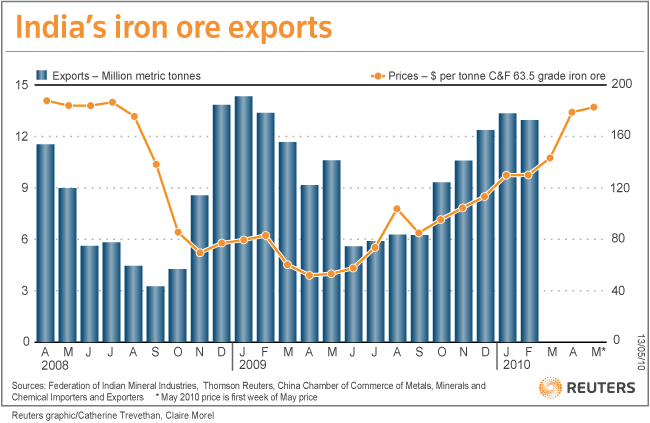Q+A-Why India is talking about curbing iron ore exports
Wed Jul 14, 2010 11:17am GMT
af.reuters.com
By Ruchira Singh
NEW DELHI July 14 (Reuters) - India's steel ministry has again demanded curbs on iron ore exports for the world's third-largest supplier, and a key source of raw material for China. [ID:nSGE66D072]
Below are some questions and answers about the issues behind frequent calls for export curbs by steel firms and a section of the government.
WHY DOES THE STEEL SECRETARY WANT TO CURB IRON ORE EXPORTS?
* The steel ministry voices the concerns of the steel industry that has long lobbied for a ban on iron ore exports as they want more of the raw material preserved for domestic plants as most of them have ambitious expansion plans.
WILL THE INDIAN GOVERNMENT DO WHAT THE STEEL MINISTRY WANTS?
* Not necessarily. It will also consider the views of the mines ministry. This year, India's mines minister B.K. Handique told Reuters in an interview that he was not in favour of a higher tax on iron ore exports as he was concerned about the livelihood of small miners, exporters and the people employed in the sector. [ID:nSGE61L0CO]
Other than the concern about the hundreds of thousands of jobs in the 316 iron ore mines, the government would worry about its revenues from iron ore export taxes.
There is also broader concern about relations with northern neighbour China. The two countries fought a brief border war in 1962 and India is home to the Dalai Lama who fled Tibet after the Chinese takeover. The two sides however have made attempts in recent years to expand trade and political ties.
HOW WILL IRON ORE EXPORT CURBS HELP INDIAN STEEL PLANTS?
* India's steel industry, which produced 55.1 million tonnes of the metal in 2009, would get iron ore at lower prices as there would be a domestic surplus.
Big companies such as Steel Authority of India Ltd (SAIL.BO: Quote) and Tata Steel (TISC.BO: Quote) have captive mines and are protected from fluctuating market-linked prices, but they would also benefit in the long run as India's iron ore reserves would not get depleted as quickly.
WHO LOSES IF IRON ORE EXPORTS ARE CURBED?
* China, which has the world's largest steel mills, would have to depend more on imports from Australia and Brazil and may have to pay higher prices as a result.
India's iron ore miners and exporters would face a fall in demand and get lower prices in the domestic market if export restrictions are placed.
In 2009/10 India produced 226 million tonnes of iron ore and exported about half of it, mainly to China.
* WHAT DO THE MINERS SAY?
They argue that there is no need to curb exports as Indian steel firms mostly use high grade ores, while low grade ores and fines are shipped to China where steel makers have the technology to blend it with high grade ores from Australia and Brazil.
The also say that if they are not allowed to export low grade iron ores there will be no place to store or dump it because local steel mills do not buy it.
HOW WILL THE GLOBAL MARKET REACT TO IRON ORE EXPORT CURBS?
Any reduction in Indian supply can support prices that have retreated since the end of April after Chinese steel mills curtailed their iron ore purchases.
A major jump in prices is unlikely because the outlook of the international steel demand is dull and China steel mills have curtailed their production.
Spot iron ore .IO62-CNI=SI of 62 grade was quoted at $117.60 a tonne on Tuesday, down $0.50 from a day ago. Tuesday's price is 36 percent down from a this year's peak at $184.80 on April 23.
WHAT HAS BEEN INDIA'S POLICY ON IRON ORE EXPORTS SO FAR?
India has frequently tinkered with the export tax on iron ore. Usually it raises the tax when prices are high to help local steel firms. It has also cut the export tax in the past, when the market situation was different.
 |





